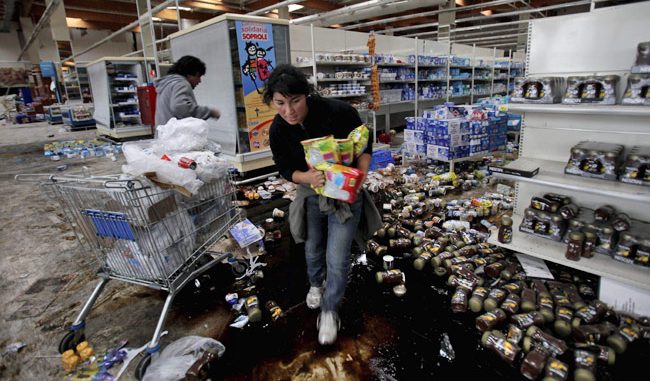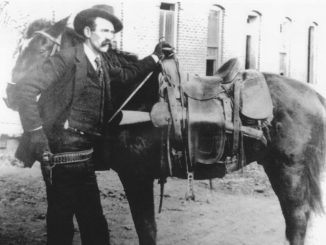
Just in time inventory is a business model used by almost every retailer these days. Fuel, automobile parts, medicines, and grocery stores operate on a just in time inventory system. What this means is that in order to keep costs down, they only stock enough parts, supply, or food for just a few days at a time. Warehousing space costs money, as does

stock of product. One would have to pay rent for additional space, and then pay the cost to fill it with inventory until such time as it was needed. But, in the age of overnight or two day delivery and electronic inventory systems, it has become much cheaper to only inventory what is needed for a few days, and order new product as your supply starts to dwindle. Electronic inventory and tracking makes it easy for stores to estimate how quickly any product is selling, and they can simply order more before the supply runs out. This model works for most retailers in most areas of the country, but when it comes to critical necessities of life, like food, fuel and medicines, what has become standard and convenient has also become a recipe for disaster.
 The average American family relies on their local supermarket for food, and on average makes about two trips to the grocery store a week. They rarely keep much more on hand, which means that at any given time, most Americans do not have more than 3 or 4 days’ worth of food on hand at any given time. Why would they, when they incur the same costs to stock food for longer period? They can always just go to the grocery store and get what they need at a moment’s notice. Just in time.
The average American family relies on their local supermarket for food, and on average makes about two trips to the grocery store a week. They rarely keep much more on hand, which means that at any given time, most Americans do not have more than 3 or 4 days’ worth of food on hand at any given time. Why would they, when they incur the same costs to stock food for longer period? They can always just go to the grocery store and get what they need at a moment’s notice. Just in time.
In fact, today, 40% of Americans are living paycheck to paycheck. This is up from 31% in 2012, a jump of 39% in just the last 4 years. That means they have just enough money when their paycheck arrives to get them through to the next paycheck. Similarly, Grocery stores typically only stock three or four days’ worth of food as well. They count on tractor trailer deliveries several times a week, and in many cases shipments come directly from grower or manufacturer, not from warehouses. After all … warehousing product is costly.
This wonderfully convenient system of living has become common place these days, and no one gives it a second thought. That is, not until something uncommon place occurs. I laugh every time I see Vic Dibitetto’s “Bread & Milk” video, but as funny as it is, it’s only humorous because of the implicit truth in it. Whenever it snows, or a big storm is coming and we expect to be stuck in the house for a few days, we all run out for the “Bread & Milk”, and whatever last minute supplies we need to tie us over. That means if we haven’t been to the store for two days … we run out and get two days more supply to bring us up to a full four days of reserves again.

How many times has the news reported a big storm coming, and you head to the store to find the parking lot jammed, the stores full of other shoppers .. and the shelves nearly stripped bare ? Most of the time we find what we need, and give it hardly a moment’s thought. But it doesn’t require global Armageddon to bring these dangers to the forefront. Those that live in the Midwest, where tornadoes are a regular occurrence, or on the east coast where hurricanes can and do hit, have at some time experienced a disruption in that delivery system.
Whether it is storm, flood or earthquake, breakdowns do occur, and having lived through disasters of just this type, and can tell you stories from firsthand experience. People have been shot or stabbed while

waiting on line for gasoline, and despite plenty of forewarning, I have seen people stand on line for hours on end waiting for food handouts from FEMA. I have seen National Guard in HumVees with mounted automatic weapons, and helicopters enforcing curfews after storms that were predicted a week in advance. Society and civility is a thin veneer, and like a mask, it hides the true nature of man. It does not take long for the true face of the beast to show itself. In a natural disaster, looting will begin in days. And by day 10 – 14, the stabbings, shootings and violent robbery starts. When trees come down, and the power goes out, when the highway is washed out and the airport is unusable .. the shipments can’t get through.
Today, in 2017, now more than ever, we have become a society of dependents. Our grandparents are probably looking down at us and scowling. If this can occur in a small localized incident, when people know full well that life Is proceeding normally just 50 or 100 miles away … what would happen if we were to experience failure on a much larger scale ?
 In 2003 the power grid failed for a large portion of North Eastern North America. In this instance it was restored relatively quickly, but the vulnerability of our power grid and drinking water systems has been a hot topic on the floors of congress. Terrorism on the scale of both the lone wolf and state sponsored level are more of a concern than ever. One does not need WMD’s to kill a million people these days. All one needs to do, is to do enough damage to the power grid to turn off the lights for any extended period of time, and we will do the job for them and kill each other off on a wholesale level.
In 2003 the power grid failed for a large portion of North Eastern North America. In this instance it was restored relatively quickly, but the vulnerability of our power grid and drinking water systems has been a hot topic on the floors of congress. Terrorism on the scale of both the lone wolf and state sponsored level are more of a concern than ever. One does not need WMD’s to kill a million people these days. All one needs to do, is to do enough damage to the power grid to turn off the lights for any extended period of time, and we will do the job for them and kill each other off on a wholesale level.
A solar flare, or an EMP ( Electro Magnetic Pulse ) can knock out all electricity and electronics across an entire continent. If this were to happen, we’re looking at power being out for months or YEARS.
 First the food would run out, and then fuel. Factories would no longer be able to operate, trucks would no longer be able to refuel. Shipments would end, and medicines and necessities of life would cease to exist. Once this happens, it is no longer just a matter of turning on the lights again. A cascade failure of our entire society would occur, and the beast would be out of the box. It would be only days before police and firefighters stopped showing up to work, because they would be too busy taking care of and protecting their own families. Buildings would burn which would turn into entire cities reduced to ashes.
First the food would run out, and then fuel. Factories would no longer be able to operate, trucks would no longer be able to refuel. Shipments would end, and medicines and necessities of life would cease to exist. Once this happens, it is no longer just a matter of turning on the lights again. A cascade failure of our entire society would occur, and the beast would be out of the box. It would be only days before police and firefighters stopped showing up to work, because they would be too busy taking care of and protecting their own families. Buildings would burn which would turn into entire cities reduced to ashes.
Whether it is for a small scale, or large scale disaster, we advise being prepared. Even if you are not part of a militia or security group and are just a simple family man. The survival of your family may depend on how long you can hold out without having to go out and forage. And for you survivalists, I’d like to point out something for consideration. During the Great Depression of the 1930’s, wild game was hunted to near extinction. I wouldn’t bet all of my plans on hunting for the survival of your families.
 An often told old joke is that you do not need to outrun the Bear, you just have to be faster than the other guy. That being said, your first 30 days are going to be the most critical. If you can last the first 30 days, you will have done a lot better than the other guy. But after 30 days, you will be facing the most ruthless of those left alive. It is our strong recommendation to supply at a bare minimum, 90 days’ worth of food for each and every member of your family. Of this 90 day supply, we suggest 2 months of dry and canned goods. We’ll go over storable items and nutrition for this at a later time, but it is not difficult to build up a supply of some basic meal items. 40 pounds of pasta, or a hundred pounds of rice and beans can go a long way. But in addition to those 2 months of standard dry goods, we suggest 30 day supply of emergency freeze dried goods and meals. You will NOT be eating the freeze dried goods first. Start with the rice and beans, and macaroni, and canned meats. These items are heavy
An often told old joke is that you do not need to outrun the Bear, you just have to be faster than the other guy. That being said, your first 30 days are going to be the most critical. If you can last the first 30 days, you will have done a lot better than the other guy. But after 30 days, you will be facing the most ruthless of those left alive. It is our strong recommendation to supply at a bare minimum, 90 days’ worth of food for each and every member of your family. Of this 90 day supply, we suggest 2 months of dry and canned goods. We’ll go over storable items and nutrition for this at a later time, but it is not difficult to build up a supply of some basic meal items. 40 pounds of pasta, or a hundred pounds of rice and beans can go a long way. But in addition to those 2 months of standard dry goods, we suggest 30 day supply of emergency freeze dried goods and meals. You will NOT be eating the freeze dried goods first. Start with the rice and beans, and macaroni, and canned meats. These items are heavy

and bulky and not easily transportable, and a years’ supply, while great if you can do it, will do no one any good in a bugout situation if you have to leave it behind. The freeze dried foods are your last resort if you are bugging in, but if you need to be mobile, that is what you are going to pack. Prepare for water needs to go along with them. Water purification of some sort, and a means for heating water to prepare meals on the go.
[adrotate group=”4″]
Many prepper or militia groups like to play soldier in the woods. They will stockpile guns and ammo, practice at the range or conduct tactical exercise with live ammo, or paintball or airsoft. We applaud organization on a community, county or State scale. We highly stress medical training and radio communications. But if you are looking to be a militia or Minuteman, Your teams may be out providing medical assistance for residents or security for local retailers, such as Oath Keepers did in Ferguson Missouri during rioting in 2015. Or perhaps you need to send out a squad to scout of dispatch marauders. Your team will be subject to the same conditions as law enforcement and firefighters. At the time when your team is needed, they may become scarce if you have not put together a plan that encompasses the entire family unit. No one is going out in the field if it leaves their families vulnerable, so don’t be short sighted. I have seen many groups trying to put together some kind of cache of stores for the whole group, and in my experience people planning for the unexpected often have trust issues. I personally am not giving anyone any of my money to buy supplies to be stored in a container on someone’s farm. It becomes a target for thieves, some of which may end up being your own team, and if you are unable to get to the location, it is a recipe for starvation.

Again, we believe in planning on the family scale. Whatever your situation or scenario, you cannot be of assistance to anyone if you or your family are starving. Look around. What can’t you live without? Whatever it is, it is your weakness and Achilles heel and it can be used against you. Don’t be put into a position of trading your guns and ammo for food, if you can help it. If you need to dispatch a team into the field, some people can be left behind to provide security, and if every family has a 90 day supply of food, it becomes much easier to contribute supplies to your field team on a mission.
George Washington knew this all too well. “An army marches on its stomach.” Don’t lose the fight before it has even begun.
[adrotate group=”4″]

[pt_view id=”517b65fj16″]





Be the first to comment